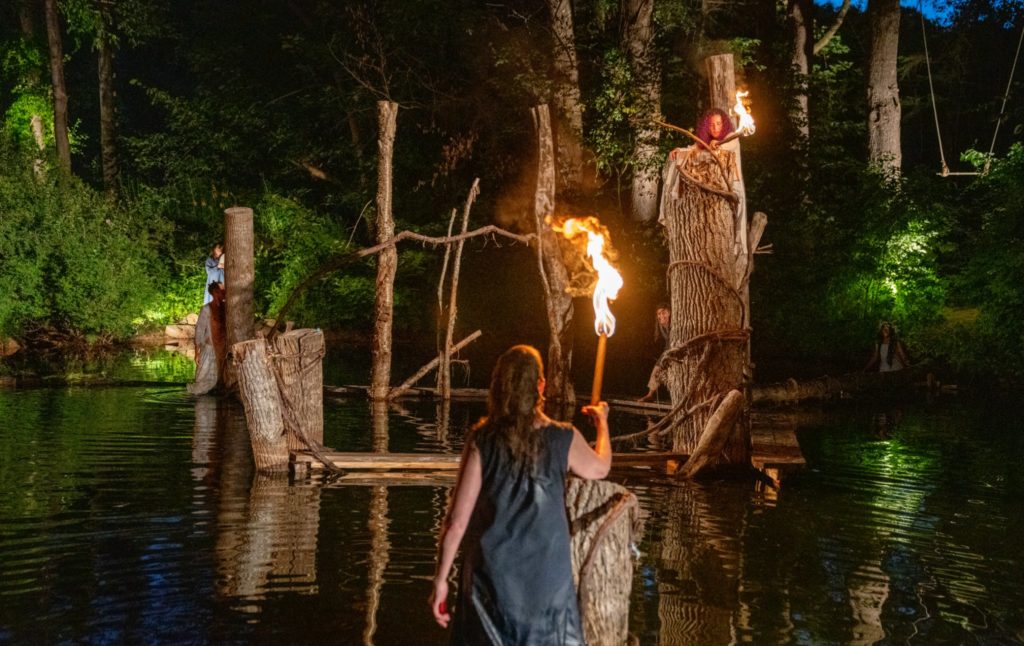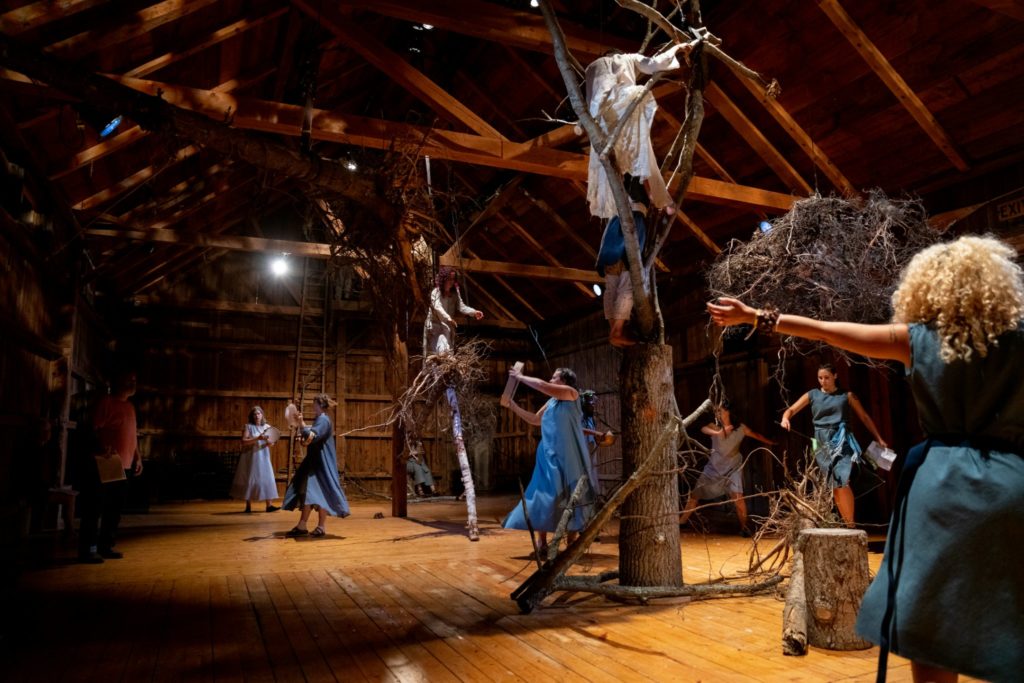
Photos by David Weiland & Graceson Abreu Nunez.
Presented by Double Edge Theatre
A response to The Bacchae by Euripides
Conceived, directred, and designed by Stacy Klein
Co-created and adapted with Milena Dabova, Jennifer Johnson, Travis Coe, and Carlos Uriona
Musical compositions and direction by Amanda Miller
Wed – Sun, July 20 – July 31 at 8pm, August 3 – 6 at 7:30pm
The Farm
948 Conway Road
Ashfield, MA 01330
Tickets
Review by Maegan Bergeron-Clearwood
ASHFIELD, Mass. — Driving along the twisted back roads to Ashfield, Massachusetts, my friend and I were in high, hopeful spirits. Double Edge Theatre, now in its 40th year, has crafted a foolproof yet ever-surprising mode of experiential performance. Season after season, it guides wide-eyed audiences through a labyrinth of natural scenic tableaus: dancers weave spiral paths through waist-high grasses; actors spin poetry from atop boulders, trees, ladders, canoes, and stilts; aerialists swoop across the rafters of the warm wooden barn. And, so my friend and I joyfully trekked 40-plus minutes to a remote stretch of farmland, expecting an evening of unexpected delights.
But the most delightfully unexpected element of The Hidden Territories of the Bacchae was not at the behest of the artistic team, but was instead a brilliant creative choice from Double Edge’s most important collaborator: the weather. About 40 minutes in, dark storm clouds started to impede our otherwise picturesque dusky tableau. Dionysus’ (played by both Travis Coe and Milena Dabova) braggartly claims of godlike power took on awe-inspiring meaning, and the performers leaned into the new subtext. We in the audience chuckled at the sky’s clever dramaturgical timing, but nervously so. We were not only at the mercy of the elements, but of our Double Edge guides, and we could only hope that our trust in them was not unfounded.
But then, what could have been a total disaster proved to be the most uplifting part of my week.
The worldwide heat waves of late have thrown me into a state of heavy, sluggish dread. The consequences of centuries of imperialistic greed are being realized before my very eyes – I’m rightfully terrified, and I should jump to my feet and do something, but I don’t feel mobilized: I feel resigned.
But Sunday evening offered a powerful, if impromptu, metaphor for radical imagination, and by extension, radical change. When the Double Edge ensemble were alerted to the possibility of a rainstorm on the evening of their press performance, they could have canceled; or, they could have pushed through, performing until the audience was drenched and terrified, sending us scurrying to our cars. Instead, they called upon their years of outdoor theatre wisdom. The management team strategized a plan via headsets. The Dionysuses improvised a speedy ending to their scene. Our guides calmly and confidently led us to the barn for a scene of bacchanalian revelry. Drums and chanting kept time against the backdrop of heavy rain pounding on the roof. We weren’t treated to the last two scenes of the show (missing out on what was sure to be an incredible act of fire artistry), but we were safe and dry. The ensemble trusted each other; we spectators trusted the ensemble. We listened to each other, responded, and mobilized.

Photos by David Weiland & Graceson Abreu Nunez.
This metaphor is baked into the show itself. Double Edge’s response to (rather than adaptation of) Euripides’ The Bacchae is interested in matriarchal knowledge systems, ways of moving through the world that are under historical and constant threat by patriarchy and colonialism. Doing away with much of the source material’s text, the collaborative team created space for the Bacchae. The program said, “women gathered from around the world,” to “rematriate their own languages, ritual, ceremony, and story, such as Anishinaabemowen, as well as Chinese, Polish, Kechua, Hebrew, and Spanish in addition to English.”
In letting the Bacchae use their own voices, in focusing on sensation, embodiment, and joy, and in responding to the here-and-now realities of time and space, Double Edge not only envisioned but enacted alternative ways of being in relationship with both each other and the earth.
It is possible to act harmoniously and swiftly in times of crisis, to act “with the weather” rather than “in spite of the weather,” as director Stacy Klein noted after the performance. It is possible to cultivate deep trust, through long-standing collaborative processes, certainly, but also in-the-moment with a crowd of terrified strangers who would otherwise stand, frozen, beneath darkening skies.
